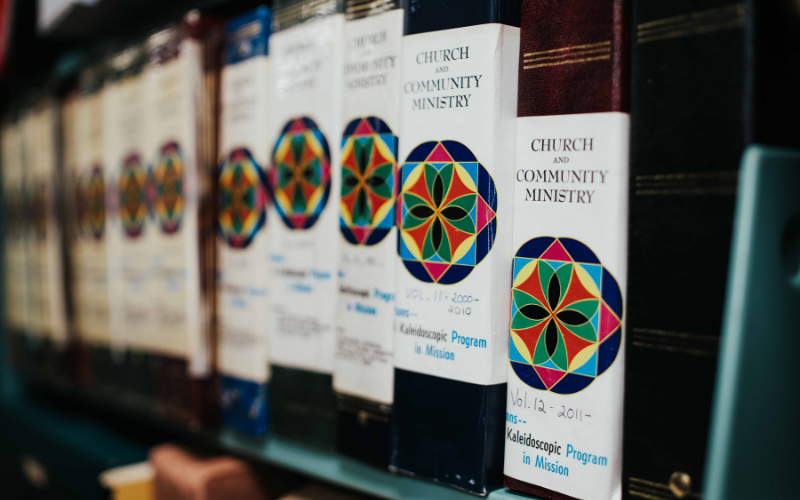The half of knowledge is knowing where to find knowledge.
Laskey Research Library and Archives

In 2022, the Scarritt community is celebrating the 70th anniversary of the integration of Scarritt College for Christian Workers. In the early 1950s, the faculty submitted a letter to the Board of Trustees stating the case for integration of the college. The letter was drafted by the professor of social anthropology, Ina Corinne Brown, who had authored "The Story of the American Negro" (1936) and "Race Relations in a Democracy" (1949).
A portion of the letter reads, "In light of these considerations the faculty and staff of Scarritt College believes that the time has come when it is not only appropriate but obligatory that we actively seek a solution to the problem posed by the State laws which now make mandatory on our campus a practice which is out of harmony with the mission entrusted to us by the church. The mandates of Christian conscience no longer permit us to say that we can do nothing about racial exclusion on our campus until the State amends the Constitution. It is our conviction that we should either seek a new interpretation of the law as it affects church-related institutions or act through education and legal channels to change the law."
In September 1952, two African-American women, DeLaris Johnson and Lelia Robinson, were admitted to Scarritt as full-time students.
Throughout their time at Scarritt, Johnson and Robinson were leaders in Scarritt life. Robinson served as editor of the school yearbook, the “Scarritt Archway,” and sang in the “Scarritt Singers.” Johnson was Treasurer of the student council and leader in the Devotional Life committee. In 1954, they each graduated with their Master's degree.
In 1954 they each graduated with their Master's degree. At their graduation, the invocation and benediction were delivered by Rev. Ernest T. Dixon, who went on to be elected bishop (1972) by the eight-state South Central Jurisdictional Conference of the United Methodist Church, the first African American elected by that Jurisdictional Conference.

in Missions and Social Justice

Research Library
The Virginia Davis Laskey Library houses a collection of more than 12,000 titles primarily on women’s leadership in missions and social justice around the world. While much of the collection was acquired to support the students of Scarritt College, today it serves as a resource for scholars and anyone else interested in Scarritt Bennett Center’s rich and varied history. On our shelves patrons will discover student theses, a vast reference collection of various United Methodist agencies, a wide range of cultural studies, an extensive collection of American Civil Rights Movement writings, and more.
What's in the Library: The Library's collection houses content that fall under five (5) main areas:
Women's History (issues and rights: current and past, national and global, including women in the church)
Mission (150+ years of publications on mission theory, missions, and missionaries)
Spirituality and Spiritual Formation (including a wide range of devotional materials by women writers)
Worship and the Arts (including a large collection of hymnals and resources on liturgical design)
Multiculturalism and Diversity (including historical scholarship on race relations)
We are not a lending library, but we do invite researchers to use the collections on-site. Our visiting hours are weekdays, 9:00am–4:00pm, by appointment only. Click here to schedule your visit.
The Virginia Davis Laskey Library was dedicated and opened on April 1, 1968 at Scarritt College. The library was the final building added to the Scarritt College campus and was a gift of the Women’s Division of the Methodist Church through its "call to prayer and self-denial" offering from the Women’s Society of Christian Service and the Wesleyan Service Guild. The Woman’s Division of the Board of Missions of the Methodist Church also contributed grants. A Nashville committee under the leadership of Mrs. Henry Cannon, “Minnie Pearl” of Grand Old Opry fame, raised $50,000 for library furnishings.
The library was named to honor Virginia Davis Laskey of Ruston, Louisiana. Laskey devoted her life to the United Methodist Church. She taught Sunday school for more than 25 years, was a member of the Board of the Louisiana Methodist Children’s Home and the MacDonnel United Methodist Children’s Service, and served as the national president of the Women’s Division, Methodist Board of Missions from 1964 to 1968. She was one of only five women members of the World Council of Churches and was a two-time delegate to General Conference.
On March 9, 2007 the library officially became the Virginia Davis Laskey Research Library, with a focus on organized societies of lay women. The Laskey Research Library allows people today and in future generations to understand the struggle, faith, and vision of women committed to mission, justice, and peace ministries all over the world.

Research Library Catalogue
Most titles in the catalog are from the library of the former Scarritt College for Christian Workers or from the former Women's Division of the United Methodist Church. Titles are added to the catalog weekly.
Content Warning
Certain words or descriptions in this catalog and in the collection reflect the author's attitude and/or are reflective of the time in which the item was created, and may now be considered offensive.

for Christian Workers

The library’s archival collection, some of which is more than a century old, consists of personal papers and institutional records of faculty, alumni, and affiliates. These documents chronicle the story of Scarritt College for Christian Workers, from its early days as a place where women became deaconesses, through the Great Depression and Civil Rights movement, to its present day role as a forum for social justice work and spiritual formation.
WHAT'S IN THE ARCHIVES
The archival collections at the Laskey Library contain resources handed down from Scarritt College and Scarritt Bible and Training School. Such items include College materials (yearbooks, newsletters, calendars); student files (college applications, newsletters from missionary alumnae, birth and death announcements, photographs, news clippings); alumni/ae theses and dissertations; rare documents concerning the institution's history; personal papers of missionaries and Scarritt College faculty; and documents from National College, The Kansas City National Training School, and The Alumnae Association from 1900-1980. Recent additions also include papers from retired executives of Women’s Division and United Methodist Women.
Researchers are invited to use the collections on site at the Laskey Library. Because of the fragile nature of much of these materials, and so that we can best help you, we ask that researchers make an appointment before visiting either the library or the archives.
LIBRARY HOURS
Weekdays, 9:00am–4:00pm, by appointment only. Click here to schedule your visit.

Archives house primary source documents—e.g. letters, memos, meeting minutes, speeches, photographs—that contain firsthand information about a topic or event. Primary source documents are often unique or rare and can add depth to your research.
Archival materials are generally arranged by provenance—that is, they are grouped according to who collected or compiled the materials. Each collection is divided into boxes, which contain folders that are arranged either topically or chronologically.
Each processed collection has a descriptive document called a finding aid. The finding aid describes the collection, including its context, its creator, and its original purpose. The finding aid is divided into sections describing the collection’s creator, the formats of materials it contains, the time period that it covers, and the subjects that it covers. It also contains a list of the folder titles that can be found in each box. Finding aids generally do not include links to digital materials; instead, they describe the materials contained in our physical collections so that you know what materials will be useful to you. About 25% of the materials in our archives currently have finding aids.
Click here to view our Finding Aids.
The Laskey Archives also has some unprocessed collections, which means that the materials have not yet been moved into archival-quality boxes and folders and we do not yet have detailed knowledge of what the collection contains. Most unprocessed collections are still open for research; however, navigating them will require a lot of time and patience. Ask the librarian about access to unprocessed collections.
Other Institutions Housing Materials Related to Our History

Laskey Research Library & Archives
Laskey Research Library & Archives welcomes scheduled appointments on weekdays from 9:00am–4:00pm.
Staying on Campus: On-campus lodging options are available for out-of-town researchers who would like to arrange an extended visit to the Laskey Library and Archives.








